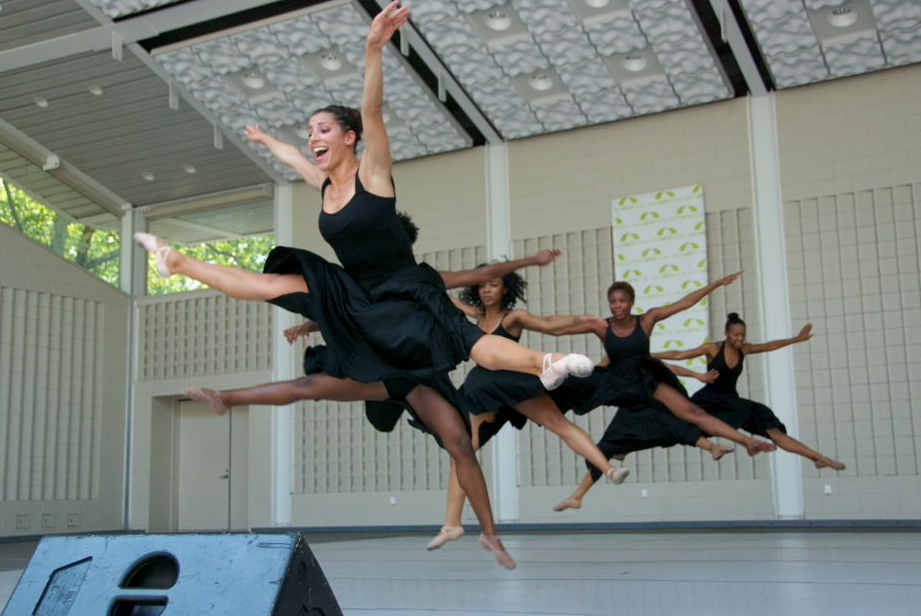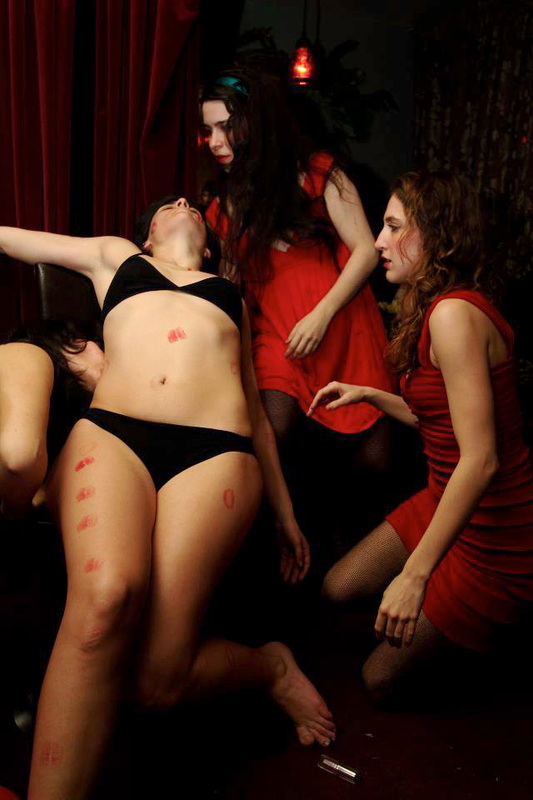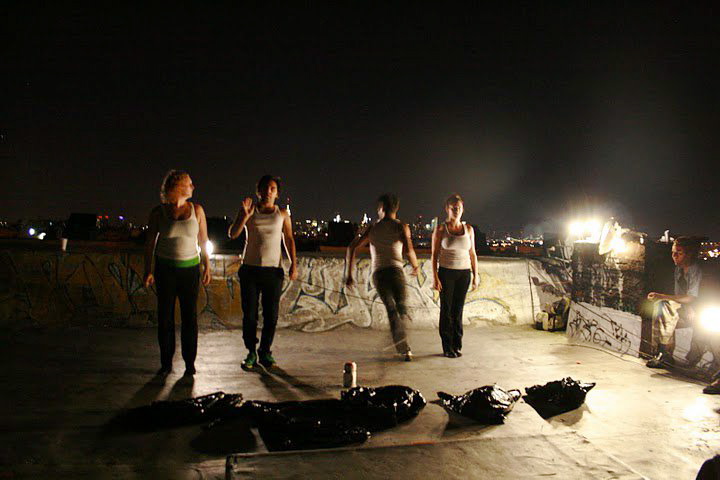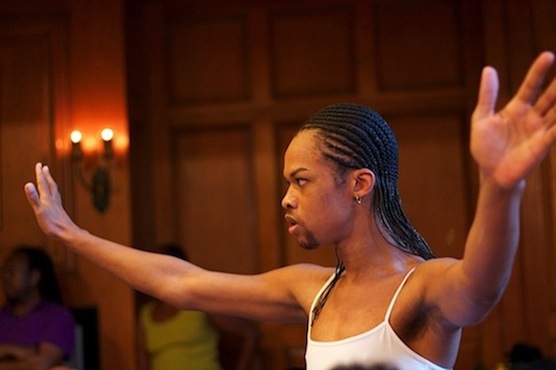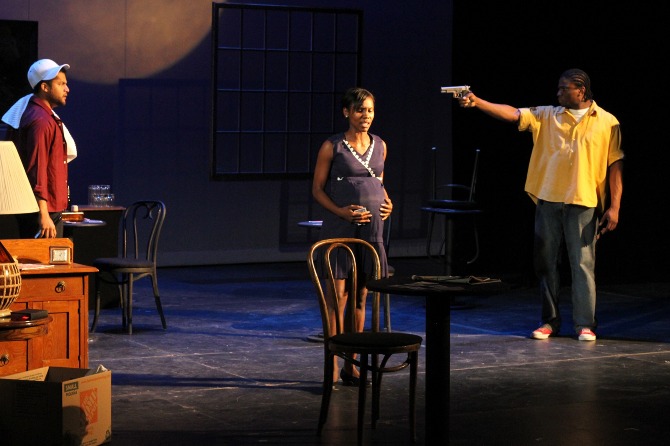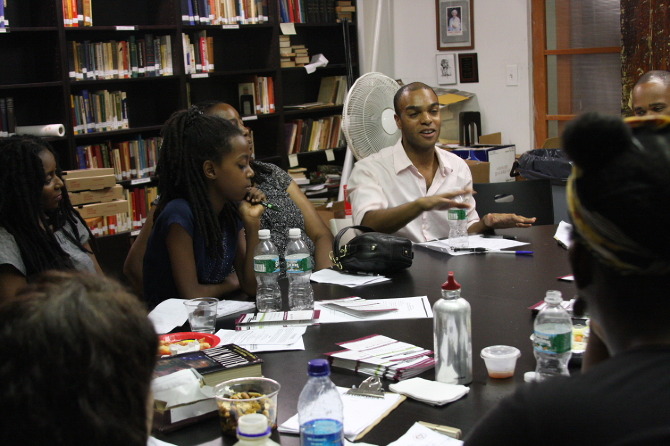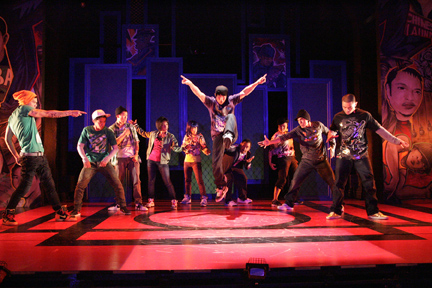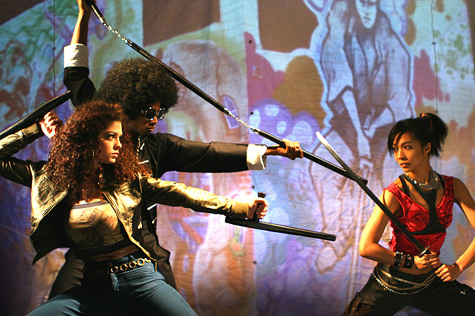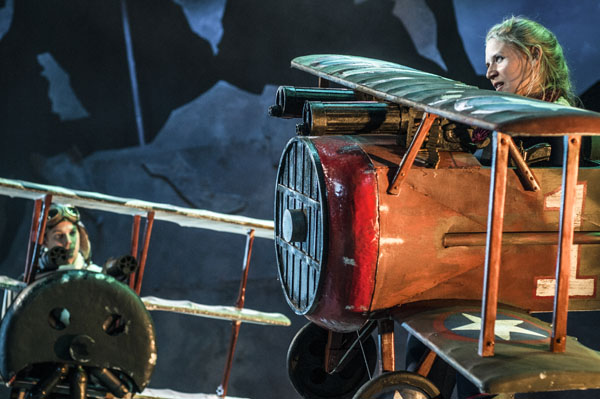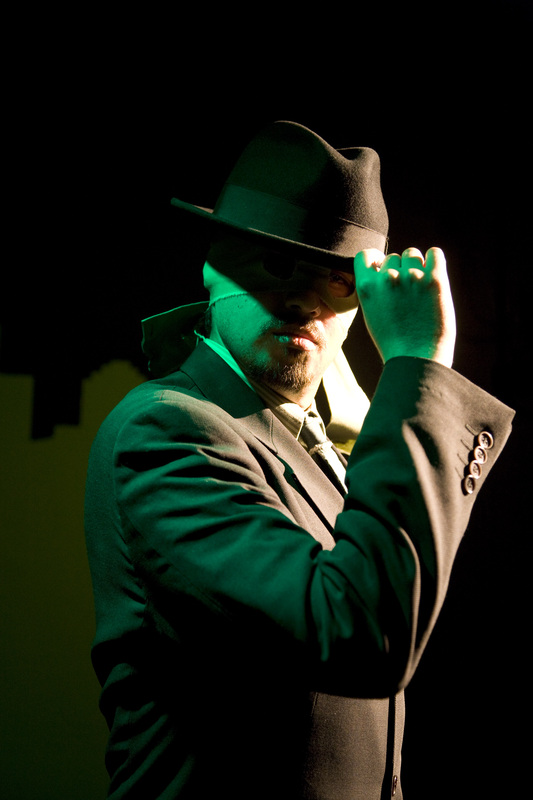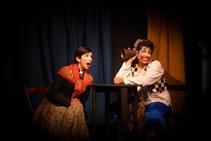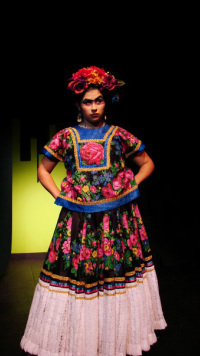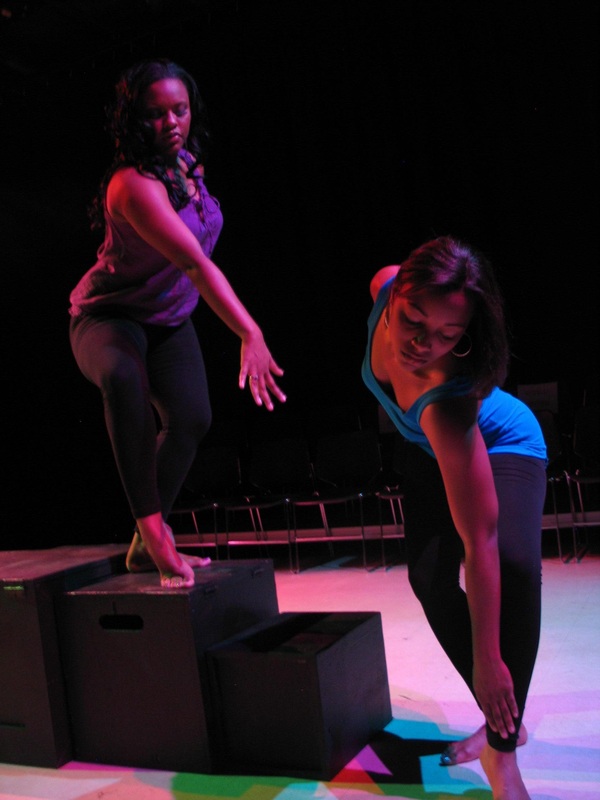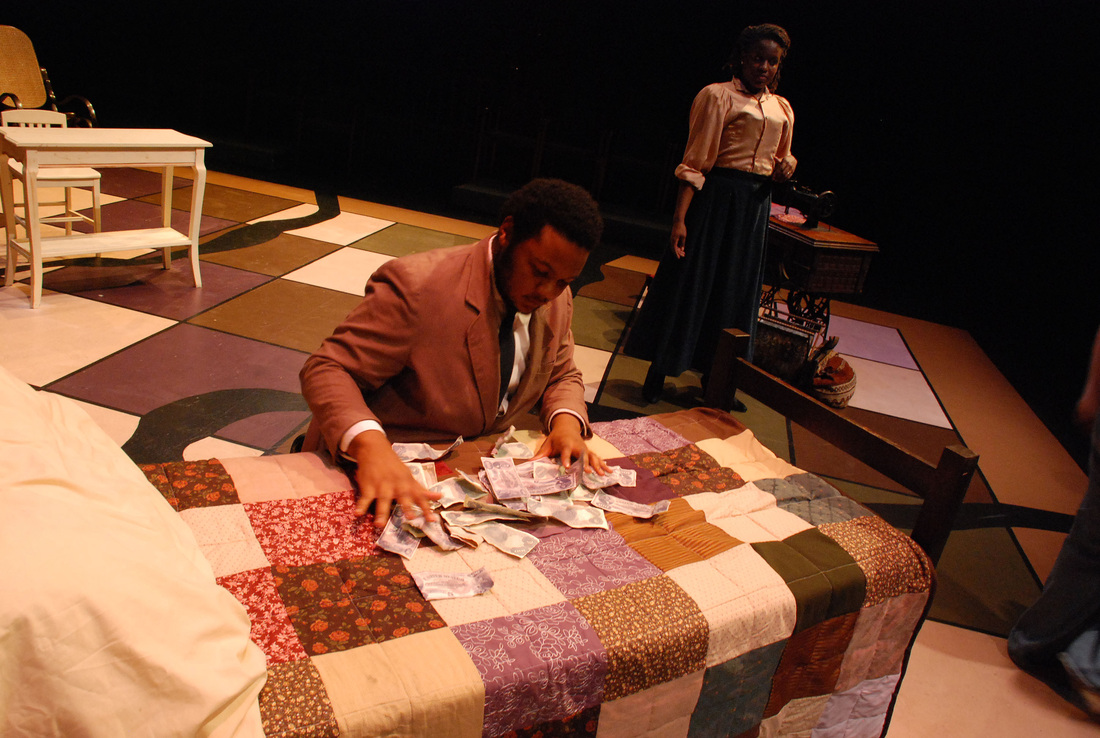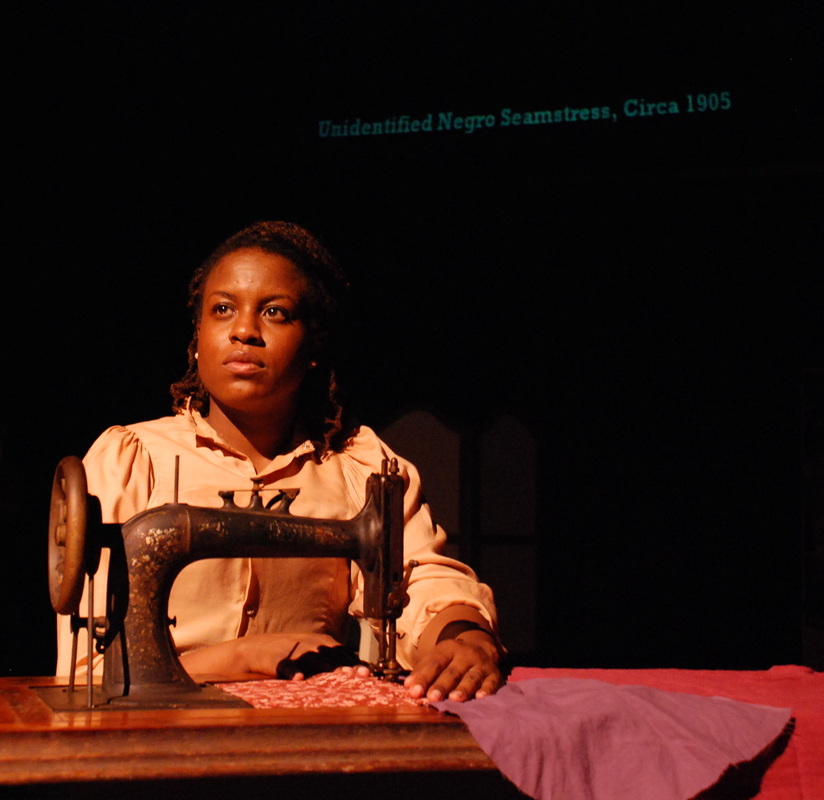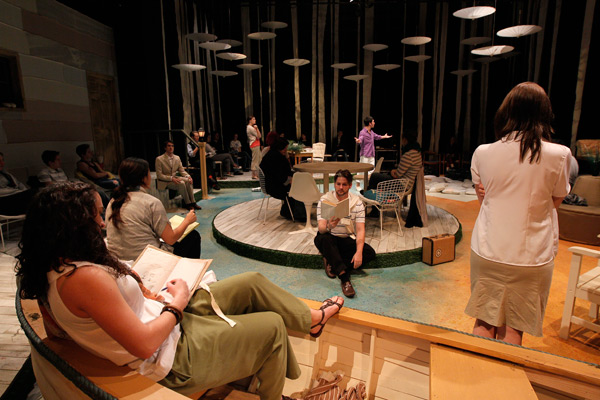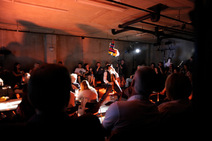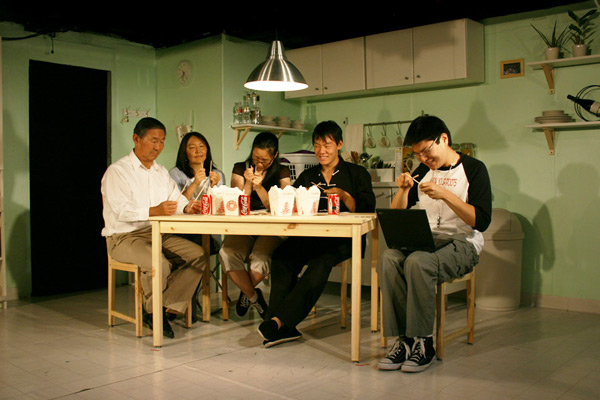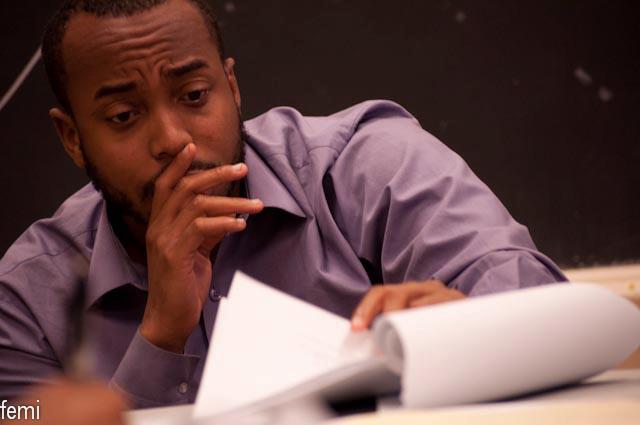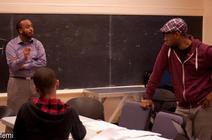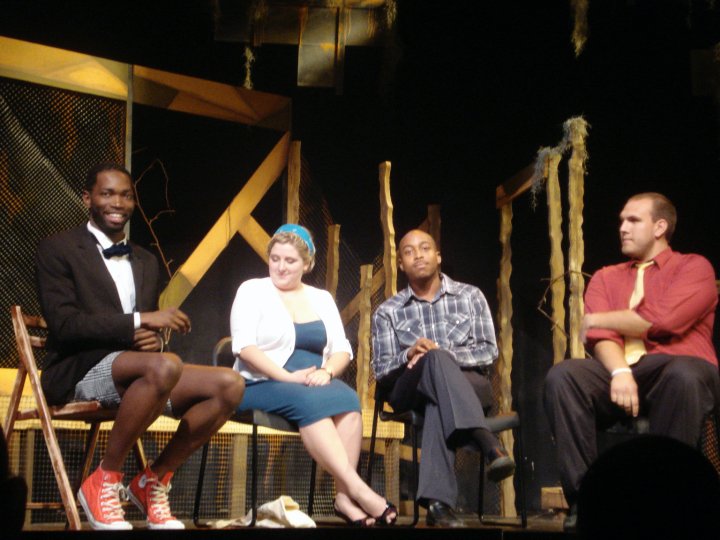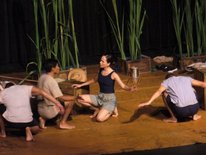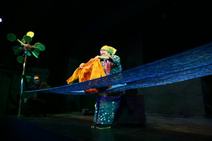|
Jacqueline Lawton: Give us a little background on where you’re from originally, where you grew up, and how you ended up where you are now…
J.J. EL-FAR: I think I have always known that I was an artist. I grew up in a little Easter egg of a town in Massachusetts that no one has ever heard of. My first big hits were plays I wrote or adapted from my favorite books and directed in my basement with all my cousins and neighbors. They were thrilled when I finally joined a community theater and stopped forcing them to rehearse in a dank basement in the middle of the summer. I guess having a big family was one of the benefits of having an Irish Catholic mom and Jordanian dad. My life is kind of like an elongated and less funny version of my big fat Greek (Arabic) wedding. I have something like 40 first cousins and not a single one of them has ever dreamt of becoming a vegetarian. Then I threw everyone for a loop and went to Brandeis University, (a.k.a Jew U). I’m pretty sure they took me because they figured a Catholic Arab girl was like two birds with one stone or something for their diversity quota. At college I started the Free Play Theater Cooperative, the only company on campus making experimental work with free admission to all the plays. I studied acting and performed in a bunch of plays, including one truly awful play by Theresa Rebeck (no offense, Theresa- you’ve done much better work since) which required me to play a hoop-skirt wearing Octaroon. Yep. We now refer to that as “the play which shall remain unnamed.” I also was the production stage manager for the Bernstein Festival of the Arts, and I started a Playback Theater troupe on campus. JL: Why did you decide to get into theater? Was there someone or a particular show that inspired you? JJE: Well, there was one point when I was 12 when I had my dance recital and the production of the play I was in on the same night and I finally had to choose between them (I was a pretty hard core dancer for a while) and I picked the play. I’ve never stopped picking the play since. During my junior year at college I went to a reading of Betty Shamieh’s The Black Eyed at Harvard and was swept away by the play. I told Betty I wanted to do it at Brandeis and she agreed. I couldn’t decide which of the four female characters I wanted to play, so I decided to direct and that project became my thesis. The play stirred up a lot of controversy on campus, as you can imagine, and I had professors of Judaic studies emailing me pages upon pages of why the play was anti-Semitic and anti-Israel. I was pretty sure there would be picketing outside the theater. I also cast a black actress in the featured role as a suicide bomber, which stirred up all sorts of further ruckus. As it turns out, controversy makes great publicity- a lesson I still live by to this day. I remember my acting teachers coming up to me after the sold out performances saying “You’re a director! That’s why you didn’t pay attention in my class!” I said to them, “I wasn’t paying attention to the bad acting, I was paying attention to how you fixed it.” A good friend of mine brought his Russian immigrant Jewish, very Zionist mom to the production. She sat behind me during the play and I remember listening to every sound she made. At the end she approached me and very slowly said, “I normally don’t like this type of play, but that was... very very good.” That was probably the best complement I have ever received. JL: What is unique about being an artist where you live? JJE: It’s a really exciting time to be an artist in Harlem. There is a second renaissance happening with so many cultural things happening all the time it’s hard to keep up. Like anywhere else there is very much a scene here, and the movers and shakers are people like George Faison, Tony award winning choreographer and dancer, and Maya Angelou, and Mikki Shepard at the Apollo. There is also a new generation of artists, which I include myself in who are interested in preserving the traditions of Harlem, but mixing things up, bringing in fresh perspective and showcasing new talent and ideas. It’s also affordable for an artist to live in Harlem. I think that my neighborhood is a rival for Brooklyn as an artistic Mecca, where artists can still afford to live and make work. You can feel the spirits of the great artists that got their start here and there is a sense of history and purpose that is almost palpable. JL: You are the Founding Executive Director of Hybrid Theatre Works and Founding Creative Director of the Harlem Arts Festival. Starting a theatre company isn’t easy! What inspired you and what do you hope to achieve? JJE: If anyone said to me that they were thinking of starting a theater company or an arts organization, I would recommend they really think about what they want to produce, and if someone else is already doing it. In both cases, I felt that there was no other company making the work I considered “the need” in the industry. Hybrid Theatre Works is a product of Theatre Without Borders, and the arts and peace building initiative at Brandeis University as much as it is about the need for artists of mixed backgrounds to explore their multi-cultural identities. We are hybrid in word and in deed, and our work seeks to blend existing ideas and styles and push into new territory for what it means to be a global citizen and theater artist. With the Harlem Arts Festival, I got the idea when I was running in Marcus Garvey Park in Harlem and I passed the construction site around the old amphitheater. I immediately needed to know who was in charge of that space and why I had never seen a show there. It was literally an amphitheater in my backyard. I researched it and asked around and found out that despite the rich artistic landscape in Harlem, there was no multi-disciplinary arts festival in central Harlem, and no single event in that space that really utilized the amphitheater to its full potential as a world class venue. JL: Who nominated you to be a Young Leaders of Color Award Recipient JJE: I am so grateful to my good friend, and founder of The Art of the Hustle, Anthem Selgado, who I had met at the LaMama International Symposium for Directors in Umbria, Italy. Anthem is a wonderful multi-talented artist and genius of marketing, entrepreneurial skills shaking things up in San Francisco. JL: What excited you most about taking part in the conference and the program? JJE: I was excited to meet new people and expand my network. Folks that I have read about and followed, but never had the chance to meet in person. It was thrilling. I was also really excited to be recognized by TCG as a young leader of color because I hope to apply for more grants and opportunities from TCG in the future. Seth Godin was awesome. My fellow YLC’ers were awesome. I am still processing everything and can’t wait for next year! JL: What was the most valuable lesson you learned from the conference? JJE: I have never really had hands on leadership training and career development that was specifically geared for theater leaders in their early careers. I really gained a lot of insight by listening to my peers and realizing that there are so many commonalities and shared struggles between us, but also that the future of the industry really rests on our shoulders. I was happy to see so many solution oriented responses, and an openness amongst our group to share resources and ideas. Also I was sort of amazed and thrilled that the focus of the conference seemed to come back again and again to issues of sustainability, access, and diversity in the theater. I felt like everyone there wanted to know what the Young Leaders of Color had to say, and I have never felt more respected as a professional. It made me keenly aware of my own value as an artist in the field. JL: What are some of the challenges you have faced as an artist of color? What have you learned from these experiences? JJE: Honestly, I have always viewed my “color,” as an advantage more than a challenge. I think the experience of being a minority (and I mean that in the broadest way possible) is actually a huge benefit as an artist, because are always trying to distinguish ourselves and create recognizable aesthetics and personal brands, right? Do I think it can be limiting at times? Sure. The Arab-American theater world is tight knit, and we all know each other. I am grateful to that community for giving me some of my first professional opportunities and opening a lot of doors. I don’t identify solely as an Arab-American, but over and over it seems like that is the feature that people want to talk to me about. Now I find that it is important to self-identify so that others know how to value me as an artist. JL: What advice do you have for other young artists of color in the theatre? JJE: While there is still a very important conversation to be had, and infrastructure to be manipulated to allow greater access for more people of color into leadership roles in the theater, I also think it is crucial for us to broaden our concept of ourselves as not solely American artists, but at global citizens. There is much that can be gained through international exchange by hearing what it is like to make theater abroad, to learn from other populations of oppressed peoples and identify similarities and connections between us. Go global! JL: What’s up next for you and where can keep up with your amazing work? JJE: My plans continue to evolve. I am freelancing as a director and producer and I am working on directing a reading of one of the winning plays of the Fratti-Newman political playwrighting contest at the Castillo theater. Hybrid Theatre Works is currently preparing the launch of a new program called the Global Spotlight Series where we will identify a few playwrights from a specific part of the world, our first stop being East Africa, and pair them with directors and actors to create workshop productions in New York. I finally realized that I need to create my own personal website and I am making that my next project so that everything can be in one place. In the meantime, I will continue to plaster my work all over Facebook.
0 Comments
Jacqueline Lawton: Give us a little background on where you’re from originally, where you grew up, and how you ended up where you are now…
Andre Lancaster: Sure! I was born and raised in Houston in a predominately African American neighborhood called South Park--that is as far removed from middle class suburban farce as you can imagine. My father and pretty much all of the parents on my block come from the stock of black folk who got a piece of the American dream through careers in government (in my father's case the US Postal Service.) Between Houston and NYC, I was living in Austin where I was in school at UT-Austin taking classes in hmmm let's see... Anthropology, African American Studies, Critical Race Studies, Italiano, and oh yes Theater too. But there was this cowboy living there at the time who totally pulled my attention away from my classes there. You might know him too. His name was George W. Oh those cowboys; they really know how to sweep a country off her feet. So I ended up absconding from Texas and coming to NYC. I like to say I unofficially earned a bachelor's degree through my work producing black queer theater in NYC community centers and black box theaters, while I officially officially earned it last fall at SUNY New Paltz. JL: Why did you decide to get into theater? Was there someone or a particular show that inspired you? AL: That's a great question. You know I think back to August 1997 when Reverend Jesse Jackson Jr. came to UT-Austin and rallied faculty, staff, and students (including a certain eyes wide open, skinny black kid from South Park in his very first week of college.) At the time the campus was in a heated debate over a Law School professor's inflammatory remarks against affirmative action. We've all heard the Rev's voice before but hearing him fire it up in person and in front of an audience of 5,000 sent chills down my spine. After that, I became super active in campus activism. This fueled my involvement in a student of color theater company that you might know a little something about: Drive By Players. (Okay folks, the cats out of the bag. Jackie and I went to school together back in the day!) Since then my work, especially at Freedom Train, has been trying to recapture and produce moments on stage that like that rally with Jesse Jackson have a political urgency to them and that are also really personal too. JL: You are the Founding Artistic Producer of Freedom Train. Starting a theatre company isn’t easy! What inspired you and what do you hope to achieve? AL: First of all I have got to take the time to thank the Soros Foundation and the NYU Wagner School for Public Service for awarding me their 2006 NYC Social Justice Fellowship which is a two year grant that seeds the work of promising social justice and arts leaders. Without out that award Freedom Train would not where we are today. Freedom Train's mission is all about advancing new understandings of our shared humanity through plays spotlighting black queer perspectives. And we are a black queer theater that very much comes out of the black tradition of honoring the folks whose shoulders we rest on; and considering the legacy of slavery and homophobia, too much of our history has been enslaved and violated. There's a reading series at Freedom Train however that's changing that. With Fire! New Play Festival we've produced fifteen new black queer plays since 2006 including the work of Sharon Bridgforth, Jerome Parker, Ayanna Maia, and Harrison David Rivers. I took the name Fire! from a Harlem Renaissance era literary journal of the same name published by Langston Hughes, Zora Neal Hurston, and others. Their short lived journal was dogged by some intolerant prognosticating types mainly because the future Langston and Zora saw included cultural spaces like Fire! that foregrounded sexuality and gender. You ask what was my inspiration? Well there it is... Fire! JL: What is unique about being an artist where you live? AL: At Freedom Train, we have not one, but TWO black queer Buddhist playwrights: Jesse Cameron Alick and Aurin Squire. Count 'em! JL: Who nominated you to be a Young Leaders of Color Award Recipient? AL: The one, the only Claudia Alick, Associate Producer at Oregon Shakespeare Festival. JL: What excited you most about taking part in the conference and the program? AL: All of my fellow Young Leaders of Color! I just think that this year's group is such a courageous and delightful bunch. After we did the values session together on Tuesday and over the five days of the conference, it was really cool to walk with you all especially after having done that session together. JL: What was the most valuable lesson you learned from the conference? AL: You've got to produce the conference. Well not literally! But I mean assume an active role in making the conference a success, build relationships, ask yourself what ideas are in the air and how can you support those ideas and also add ones that you think may be of use to folks. You can't just sit back and be in the audience at a conference like TCG. It was cool to have so many people come up to me and share their own reflections to that crazy candy wrapper challenge I made during the sustainability plenary. JL: What are some of the challenges you have faced as an artist of color? What have you learned from these experiences? AL: I think part of it has been my own baggage and part of it has been structural and systemic challenges much bigger than me or another single person. I remember before I started Freedom Train I spent a lot of energy advocating for black queer voices on stage in one-on-one conversations after shows and at coffee shops with friends and stuff. But since 2006 I've been an advocate and, importantly, a producer of black queer theater. (I'm careful to not frame what I was doing pre-2006 as "complaining" because I feel that plays into the angry artist of color stereotype, and I think it's more complicated than that.) I can definitely see a trajectory of my work beginning with hope for more black queer theater in that complaining... er advocacy period :) and since 2006 starting to lead to real change and black queer theater that's actually happening and in front of folks. JL: What advice do you have for other young artists of color in the theatre? AL: Think outside the box and share that thinking with your peers in the room. Good theater results from surprises not secrets. JL: What’s up next for you and where can we keep up with your amazing work? AL: At Freedom Train me and two co-editors, Aurin Squire and A-lan Holt, are collaborating on a book project featuring the five years of black queer theater that Freedom Train has developed. In the fall I'm dramaturging at The Lark Play Development Center and in the room with director Isis Misdary and Public Theater Emerging Writer Jerome A. Parker's adaptation of Genet's Querelle. And last but certainly not least I'm at The Foundry Theatre this coming season as their 2012-13 Thomas Proehl Producing Fellow. We've got Brecht's The Good Person of Szechwan directed by Lear deBessonet and starring Taylor Mac up at LaMama in February 2013. Find me on Facebook, tweet me @AndreLancaster or email me at andre@freedomtrainproductions.org!! Jacqueline Lawton: Give us a little background on where you’re from originally, where you grew up, and how you ended up where you are now…
Qui Nguyen: I was born and raised in the deep south, went to grad school in the midwest, and cut my teeth in New York. And I got here with the support of many many awesome friends and one amazing beautiful wife. Currently I’m packing for the airport which seems to be my most frequent addy nowadays. I live in transit. And that’s been both fun and exhausting. I love it. Also I’m yella. But I think you coulda guessed that by my name. JL: Why did you decide to get into theater? Was there someone or a particular show that inspired you? QN: Why does the sun come up? Or are the stars just pinholes in the curtain of the night? Okay, so I’m quoting Highlander. I’m not really sure what made me get into theater. There was no particular show or cosmic event that drew me to it. In Eighth Grade while I was filling out my upcoming Freshmen Year high school schedule, my bestfriend Chuck simply leaned over to me and said “The girls in drama class are hot”. That was enough motivation for me to sign-up. And he was right. And I’ve been doing it ever since. JL: What is unique about being an artist where you live? QU: New York is the greatest shitty girlfriend of all time…or shitty boyfriend depending how you like to shake your bedposts. For the vast majority of the time, your lady barely even acknowledges you are even alive and expects you to praise her up and down no matter how much crap she throws your way. She’s expensive, she’s materialistic, and she’s crazy flaky. Today’s Jeremy Lin is easily tomorrow’s Mike D’Antoni with the simple turn of the calendar page. She will never unconditionally love you. She will never put you first. And she has many many other lovers so if you have a tendency towards jealousy then your psyche is guaranteed to get beat up on a near hourly basis. She’s a total crap lover, but here’s the “but”: When it’s good, it’s unbelievably good. We’re talking ice cream and blow jobs good. Cause the moments she wants to love you, she tells you through The New York Times. She whispers it in your lobby and gets fancy people to email you their contact info. She spells it out to you in a love letter filled with amazing reviews and soldout shows and extended runs. And in those moments you feel like Justin fuckin’ Biebers and the city is your screaming Nickelodean-aged audience. And then…when the calendar page turns…she’s forgotten all about you again. Which isn’t a bad thing. Because there’s also times when you do something and it doesn’t turn out great and all the love that could have been coming your way suddenly morphs into 99 shades of hate. Real Hate. Like Mike Daisey hate. That’s when the best thing about NYC isn’t her sexiness, it’s the fact that she’s inexplicably forgetful. And forgiving. And amazing. Like Spider-Man. Who’s also a New Yorker and you best not forget that. JL: You are a Playwright and the Co-Artistic Director of the Vampire Cowboys of New York City. Starting a theatre company isn’t easy! What inspired you and what do you hope to achieve? QN: My mom inspired me. She has this amazing greasy spoon diner in my home town. When she went to open it almost 30 years ago, people thought she was nuts. Partially because the mere idea of opening a restaurant is already crazy enough, but to do so with food that’s not your native cuisine seems down right insane. And surprisingly hamburger steaks and hushpuppies are not part of my mother’s Vietnamese cultural background. But she did it anyways. And made it flourish. And fed, clothed, and sent three boys through college and grad school with it. When asked why she was so adamant about making it work, she always simply replies “Because it’s mine. I have to make it work.” That’s at the heart of why I do what I do. Like my mom’s diner, people thought I was already nuts for starting a theatre, but to do so by creating work centered around racially diverse, gay, and/or female superheroes seemed insane. But I did it anyways. Because the art I create with my company is uncompromisingly mine. It’s my voice unfiltered, made alongside a team of artists that I trust unconditionally. I have to make it work. Because it’s mine. As for what I hope to achieve, it’s simple. I’m a storyteller. I want to tell good stories that get people excited to come see them. That’s all. And to do so with as much profanity, kung fu fights, and gratuitous action sequences as possible. Cause I’m also a geek. And proud. JL: Who nominated you to be a Young Leaders of Color Award Recipient? QN: The Playwrights’ Center from the mighty mighty land of Minneapolis, Minnesota! JL: What excited you most about taking part in the conference and the program? QN: To see if my downtown heart had a place amongst those producing regionally. I used to think it was silly to even imagine my geekster shows fitting into those mega-theatres. As it turns out, peeps not only knew who I was but they were really excited to talk to me. It was eye-opening to say the least. JL: What was the most valuable lesson you learned from the conference? QN: Todd London (Artistic Director of New Dramatists) is a straight up dance machine. Yes, I woulda said something regarding our incredible Core Values workshop or something from Seth Godwin’s amazing speech about effectively communicating to your tribe instead of futilely marketing to the masses, but I’m gonna guess the rest of my fellow YLCers got that covered. So instead I’m gonna go with Todd London is a dance machine. Seriously. That man can boogie! And he’s awesome. I love that dude! JL: What are some of the challenges you have faced as an artist of color? What have you learned from these experiences? QN: People will look at me through that prism whether I like it or not. When I first started out, I hated that fact. It felt confining. No matter what I did, the label “Asian American” got plastered on it regardless of content. If I wrote a play about disfigurement, it was automatically an Asian American play about disfigurement. If I wrote a play about Shakespearean zombies, it became an Asian American play about Shakespearean zombies. It never failed. If I touched it, it was yella. Wrote a song, Asian American song. Made a sandwich, Asian American sandwich. Had a baby, it was Jewish. Okay, so Jewish Moms win all. But mostly, mostly I had an Oriental Midas touch. And that drove me crazy. But that’s all past tense. Because 10 years later, I realize that honestly it didn’t or doesn’t matter. Regardless of how peeps in lit offices want to label me, my audience labels me something else entirely. They just label me as Qui. They fill my houses and they give me a home. And on the occasions when I get emails from them saying something nice cause I’m telling their stories in a medium they thought didn’t care about them in the first place, I realize that it’s important that I keep doing what I’m doing regardless of other people’s perceptions. Now that I’m in this business, I have no choice but to succeed. Because I’m now more than what I was when I began. And it’s because of them. My audience rocks. JL: What advice do you have for other young artists of color in the theatre? QN: One - Eat foods high in protein, never skip your cardio, and always have a weapon nearby that will extend your reach like a baseball bat. I don’t how this will help you in theatre exactly, but if there’s a zombie outbreak you’ll be ready. Two - support your peers. And I don’t mean to just pay lip service to the idea, I mean be a real cheerleader for your homies. At the conference, there was a lot of artists my age who liked quoting the line “I see far because I stand on the shoulder of giants” when talking about their careers. I got no hate for that. I’m no different. I get to do what I do because of luminaries like David Henry Hwang, Ralph Pena, Tisa Chang, and Tim Dang broke some big ol’ barriers for me years ago. But here’s the thing, though they broke those barriers, they didn’t get me here. This is not to say I got here on my own. Far from it. But the people who brought me here weren’t the theatre royalty I read about from afar, it was my fellow worker bees beside me. They helped me cut my path. And in return I will happily do whatever I can to cut down any trees for them as well. I cheer on my peers’ successes as if they were my own. Because when you’re in the brush, unless you’re one of the lucky ones who has an amazing benefactor who will airlift you out of the jungle, then the people truly hacking a path for you are you and your buddies. You may look up to the giants, but make no mistake the peeps beside you are your real heroes. Invest in your network, not just yourself. Trust me, it’ll be far more fun at the top if there’s a whole gang of you up there to party with. Plus if there is a zombie apocalypse, those are the mofos you want watching your back, not David Henry Hwang. For one, DHH sucks at using a chainsaw. And second, if he is gonna save anyone it’s gonna be BD Wong. Love your peeps, they will keep you alive. JL: What’s up next for you and where can keep up with your amazing work? QN: As an Artistic Director for Vampire Cowboys, we’re getting ready to produce Crystal Skillman’s new amazing play, GEEK, which takes the structure of Dante’s Inferno and places it in a fictional Anime convention where two geekster girls have 9 levels of geekdom to traverse to get to their infamous hero. It explores both the good and bad sides of “geek identity”. I’ve been a huge fan of Crystal for years now. She’s a phenom of a writer who mixes heart and comedy with the finesse of a magician. She’s been setting the NY downtown theatre scene on fire these last three years and I cannot be more excited to be one of the lucky theatres that gets to pimp out her ludicrously inspired work. As for me as a writer, I’m busy penning a new politically-incorrect action-comedy called WAR IS F**KING AWESOME with my frequent composer Shane Rettig. I’m also working with superstar writers Erin Courtney, Eisa Davis, Robert Lyons, KJ Sanchez, and Chris Wells, on a new show currently titled TRADE PRACTICES conceived by director Kristin Marting and designer David Morris with HERE. And I got several productions popping up across the country: SHE KILLS MONSTERS in Boston with Company One and in Savannah, Georgia with the Savannah College of Art and Design, FIGHT GIRL BATTLE WORLD in Chicago with Infusion Theatre; KRUNK FU BATTLE BATTLE in the Los Angeles area with Ponoma College, and ALICE IN SLASHERLAND in Birmingham, Alabama with Theatre Downtown and in Syracuse, New York with Red House Arts Center. I’m also currently writing stuff for my 3 year old son Sam. When it comes to work, that kid is undoubtedly my masterpiece. I just wanna keep him happy. And I’m not saying that cause I’m a doting father. I’m saying that because when Sam’s not happy, he’s a raging A-hole. And 3 year old A-holes are Satan. Jacqueline Lawton: Give us a little background on where you’re from originally, where you grew up, and how you ended up where you are now…
Alejandra Cisneros: Well I am a bicoastal baby; I was born in Miami and raised in Los Angeles, Koreatown to be exact, K-TOWN! I went to high school at Bravo Medical Magnet in East LA and graduated from UC Irvine with an emphasis in film and art history. Out of college I was working at The Simpsons as a layout apprentice, basically drawing background and all the movement between character motions. I was looking for a job in creative production and was referred to a stage managing gig at Casa 0101 by a friend. That is where I met the fair temptress named theatre and never left. JL: Why did you decide to get into theater? Was there someone or a particular show that inspired you? AC: I got into theater because it was the first job I landed out of college. I think that single experience changed the course of my life. The friends I made on my first production are still people I consider my friends today. The biggest inspiration to work in theater didn’t come from the actual production, I didn’t watch the show and think OMG this is what I have to do… it came from its director, Karla Melendez. Her ability to transform an ordinary play into brilliance and her enthusiasm to take on the challenge was ultimately my biggest inspiration. I learned everything I know about theater from her and in the simplest of terms, I wanted to do what she did. I graduated a film major but after that experience I knew that theater was the challenge I wanted to accept for the rest of my life. JL: What is unique about being an artist where you live? AC: I don’t live in Boyle Heights/East LA but I do consider it a home. All my work revolves and stems from my interaction in that community. I think, there is such a sense of family among the artists and the community that work/live in that area. I have an amazing support system of people who mentor me, Edward Padilla of CASA 0101, Jesus Reyes of East LA Rep, Ben Guillory of the Robey Theatre Company and my partner in crime, writer Anthony Aguilar. I think, as I write this, that they are more than mentors and I consider them my artistic family. JL: You are a freelance director, producer, and part of the creative team behind the cult superhero series El Verde. What was the first show you directed and what lessons did you learn that remain with you today? Also, how did you get involved with the El Verde Show? AC: Ah, the first theater show I directed was Bundles by Ramona Gonzales. It was a ten minute piece about writer’s block and anxiety, ha! It was a great time. I had assistant directed a couple of pieces but that one was all mine, muahaha. What I did learn was that when I didn’t know something that I should just ask, simple concept but a lot harder to swallow. The experience also informed my aesthetic for the comedic ridiculousness. I love to have fun onstage no matter what type of narrative we are tackling. When I directed this piece I had already assistant directed the first two incarnations of El Verde so I kind of charmed my way into directing the show by talking comic books. After that I’ve been with the show for five plus years and it’s the best time I have directing. JL: Who nominated you to be a Young Leaders of Color Award Recipient? AC: Christopher Acebo, Associate Artistic Director at Oregon Shakespeare Festival (OSF) JL: What excited you most about taking part in the conference and the program? AC: The Young Leaders of Color, definitely. Getting to meet all the YLC a day before the conference and be given a platform to hash out all our ideas was one of the best experiences of the whole conferences. JL: What was the most valuable lesson you learned from the conference? AC: Diversity is still a very necessary conversation but I think that there is a shift from the new and the veteran generations on the significance. The definition of diversity has shifted a bit and I think, at least for myself, it is a constant reminder that diversity is not just about the color of my skin. It deals with sexism, ageism, accessibility for people with disabilities, social and economic status and the language barrier that still exist. These elements stand in the way of our theatre being a universal experience. So I now have these reminders that inform my personal artistic mission and the work I create. JL: What are some of the challenges you have faced as an artist of color? What have you learned from these experiences? AC: Interestingly I think I have experienced more challenges as a young woman then an artist of color. When I started my career and occasionally today there have been situation where I have to work a little harder than the rest to gain trust and opportunity because of the way I look. I think it just takes a little persistence and a lot of patience to change people’s opinion about you or to even be given a chance to be known. The hardest thing would be giving my opinion and being brushed off as a (b!@#$). From these experiences I have learned assertiveness, empowerment, patience and tenacity. Above all, not to take no for an answer or allow disrespect of any kind. I think I learned to be a feminist, lol. JL: What advice do you have for other young artists of color in the theatre? AC: I am in no place to give advice but I can only reiterate what has worked for me. Do what you do but do it well. I always give 200% to any project I commit myself to. Have fun. Learn that EVERY experience has something for you. Work in bad theater, you can learn a lot. Get training. Experience all the elements of theatre; work the sound booth, the light booth, assist a lighting designer, handle the box office, build a set, write a grant, write a play, create a budget… Most importantly for me, say please, thank you and respect other opinions. Key word, respect, you don’t always have to agree but listen. JL: What’s up next for you and where can keep up with your amazing work? AC: Up next, I am in pre-production for Los Angeles’ 3RD annual transit festival, Meet Me at Metro which is curated by Watts Village Theatre Company. The El Verde team has been commissioned by East LA Rep to create a piece for the Marachi Plaza stop. And in all El Verde humor we will be doing a spaghetti western. I have a couple of websites and you can also friend El Verde Show on facebook. www.elverdeshow.com http://alecisneros.tumblr.com/ Also, I want to give Jacqueline a quick shout-out for being the brains and putting this all together, THANK YOU! Jacqueline Lawton: Give us a little background on where you’re from originally, where you grew up, and how you ended up where you are now…
Yolanda Williams: I am a Mississippi girl…born and raised in Jackson, the state’s capitol. I guess you can say I am a true southern belle. I love Mississippi and couldn’t imagine growing up anywhere else. It has made me into not only the person I am today, but also the artist. I grew up in a traditional southern African American family. One difference from the ideal Southern upbringing was my education. I received a Catholic education from elementary to high school and attended a small Catholic university in Dallas, TX where I majored in Drama. Instead of feeling restrictions and dogma being immersed throughout my life the experience and education I saw it as a challenge and opened avenues in exploring many forms of life and theater was a wonderful outlet. Mississippi has a less than 5% Catholic presence and being a minority within a minority contributed to my zest to take risks and encompass various perspectives in my craft. JL: Why did you decide to get into theater? Was there someone or a particular show that inspired you? YW: I feel like I have always been drawn to theatre. Performing has always been a part of my life since I can remember. One of my earliest memories was watching an episode of the Cosby Show. It was the episode where the Grandfather character and his friends came over to the family house and they recited a piece from The Tragedy of Julius Caesar. I was captivated by the language and the melodic voice and tone of the characters and wanted to hear more. I remember turning to my mom and telling her I wanted to hear more of that story. Not truly understanding the story as a whole at such a young age but, knowing that the performance made me stop and feel something inside made me know that this was something I wanted to pursue and learn as much as I could. From that point on Shakespeare works became my staple in my bedtime stories. For me there was never a choice. It was a calling. I could not see myself doing anything else. There was not a specific moment in my life when I decided that this would be what I would make a career out of, it was apart of my life that would always remain. As I continued my educational endeavors, I realized that it was something I could develop into a career. It is such a major part of my life that it would be incomplete without it. For me it has become a necessary limb. JL: What is unique about being an artist where you live? YW: It’s Mississippi, the heart of Dixie land. The state is ruled by conservative values, love of family, and God. One thing about being in the South is we are very slow in accepting change. As an artist, this presents several challenges. It can be difficult, particularly if you’re like me, and enjoy dabbling in experimental theatre avenues. You’re facing years of social, racial, religious and cultural limitations all while adapting to an audience that enjoys few changes to their expected theatre experience. But, through these challenges an artists can stretch their creative muscles. I find these challenges as motivation and often inspirational. The history and the values are indicative to the South are shown within its people and flows into the theatre community. The embrace from your hometown is a warm feeling. They are there to support you through the good and bad. Though the Theatre community is small, it’s heart and passions are strong. The South is unique and their support is in the arts is small but the pockets of supporters are devoted. Once they truly embrace you and your talents. JL: You are a Freelance Director and Professor of Theater. How do you balance your professional theatre career with your academic responsibilities? YW: Actually, working in a university gives me the flexibility to take on freelance directing work. My classes are set for the semester and I have the ability to work around my weekly schedule. Planning and sticking to my schedule is the difficult part. I feel like both enhance each other. I take from one and bring to the other and vice versa. Having an academia career gives me the security I need to take on the professional freelance work that might not be financially feasible but the quality and the work is worth wild. It allows me to seek out work that is forward thinking, competitive, thought- provoking, challenging, and sometimes risk-taking. Working at a university also gives me the opportunity to work with the new artist looking to enter into the field. I am able to help mold our great new artists that are finding their niche in the theatre world. It makes me excited to be able to work with bright minds and creative individuals and bring the work that I do in the professional world to the academic world. JL: What was the first show you directed and what did you learn from that experience that remains with you today? YW: The first show I directed was Suddenly Last Summer, by Tennessee Williams at the University of Dallas. There are a few things that remain with me from that experience and every time I direct a show. One is, you cannot predict an audience reaction to your production. I was not expecting the audience to be so caught up in the drama of my production of Suddenly Last Summer that they could not even respond with applause at the end. They were frozen in the last moment of the play while we had curtain call. I did not predict that at all. At first I thought they did not like it. I knew the themes were pushing the boundaries of this small catholic university and the audience might not appreciate it. But I was wrong. I learned I had to give my audience time to adjust to what they viewed and come to terms with what they just watched. The responsibility and expectations of taking them on an emotional journey is something I had to comprehend and accept opening night. It is important to know that your audience goes on that journey with the characters of the play. You cannot just all of a sudden bring them out of a moment. Another thing I learned is how important it is for the director to have a clear concept going into a production and be able to adapt quickly. A concept might change and morph into something bigger or smaller and more than likely something better. Adaptation is key to creativity. JL: Who nominated you to be a Young Leaders of Color Award Recipient? YW: Francine Reynolds. She’s the Artistic Director of New Stage Theatre in Jackson, Mississippi. JL: What excited you most about taking part in the conference and the program? YW: I was excited about meeting and interacting with other artists. Just being around colleagues who understand the challenges and passion I feel about theatre was motivation enough for me. The appreciation and love I have for the field as well as some of the disappointments I might share. I hoped to find encouragement and a place where I could share my successes as well as my setbacks and find ways I can enhance the arts in my community and around my state. I wanted to hear about TCG and the cutting edge theatre taking place throughout the nation and the world. I wanted to know what other artist, theaters and leaders of theaters and innovators where doing in the field and hear about the successes and challenges they were facing in the field. I was really interested in the breakout sessions and meeting many individual whose professional careers that I have followed for a while. I was hoping to hear words of wisdom and be inspired. I have to say, I was not disappointed! JL: What was the most valuable lesson you learned from the conference? YW: Diversity is not just an issue in the South, apparently it is a problem throughout the nation in theatre. It might be more prevalent in the South but, it is still something that needs to be tackled. One of the best ways to tackle diversity is by being present in the community, producing more work in different theaters that reach a broader audience. Making myself known in the arts in my community and letting them know that I am here, I am a willing to work with them and helping to figure out ways to diversify their theatre is an action I can take to diversify theatre in my area. By making myself available it can only help the arts in my community. JL: What are some of the challenges you have faced as an artist of color? What have you learned from these experiences? YW: One of the biggest challenges of being an artist of color, is being hired to direct. I love directing plays that represent people of color. However being regulated to directing only plays of color places a limit on exploring my talent and hinders my reach of communicating to various audiences and productions. I am a director that is confident in my capabilities, and as a director I can direct anything. When theaters in the South only offer one show of color in the season I am therefore in competition with all the other talented directors of color. We are competing not for our talents of directing a show in Mississippi but directing the only show of color produced in the few major theatre houses in the state. This has given me a rare opportunity to have an open discussion with artistic directors and sometimes board members in adding more diversity in their season. More diversity means more opportunities throughout the season and more opportunities not just for directors of color but also for actors of color. By voicing these opinions I truly believe this does not have to limit what they already do in their season, only open it up to opportunities that could be beneficial to the audience, the artists, and the entire theatre community in the long run. JL: What advice do you have for other young artists of color in the theatre? YW: Be strong and stay committed. This is not an easy road but it is well worth it. Being in the arts takes a passion and a drive and if you are lucky to have it, it will take you to some great places. You have to be able to adapt to different situations. My strongest gift that has helped me is my spirituality. JL: What’s up next for you and where can keep up with your amazing work? YW: I have recently started working with local musical artists. I am producing, directing and writing their shows for various venues. Musicians and theater artists have so much in common, this union seems has become a truly harmonious experience. Theatre is my life and I find it can be adapted to anything and everything I do. I have several upcoming theatre productions in the works for the fall and winter seasons in 2012. You can find more information on my website: www.yrwilliams.com. And of course the school year will begin soon! I will be directing theater productions at Jackson State University. For information on Jackson State University Speech and Theatre Department Productions please visit the website: www.jsums.edu/speechandtheatre You can contact me via email at YolandaRWilliams@gmail.com Jacqueline Lawton: Give us a little background on where you’re from originally, where you grew up, and how you ended up where you are now…
Desdemona Chiang: I was born in Taiwan, immigrated to the states with my parents when I was three, grew up in Rowland Heights, CA (a suburb on the border of LA and Orange County), went to undergrad in the San Francisco Bay Area, grad school for my Directing MFA in Seattle, and am now a freelance director working around the west coast and sometimes NY. JL: Why did you decide to get into theater? Was there someone or a particular show that inspired you? DC: I suppose with a name like Desdemona, it's a bit inevitable. It's funny, because you hear all these wondrous stories from people who can pinpoint a specific moment of inspiration in their lives, like, "I saw Peter Brook’s production of ‘Midsummer Night’s Dream’ when I was twelve that completely changed my life" or "I fell in love with the stage when I played the snowflake princess in my first grade school play." My initiation into the theatre world was not as magical. I actually came into the theatre pretty late in my life. I was a pre-med in undergrad at UC Berkeley studying Molecular Cell Biology, and my career goal at the time was to go medical school and become an Ob-Gyn. It was the first semester of my freshman year, and I was required to fulfill an arts requirement. I was flipping through the course catalog, looking for a class, and my eye landed on a class called "Dramatic Arts 10: Introduction to Acting." And I thought, "Yes. Total bullshit class. Easy A." And the rest, as they say, is history. I ended up finishing college with a double major in Theatre and Integrative Biology. And I chose theatre as a career path because I came to realize that I liked working on plays way more than I liked biochemistry or dissecting human bodies. JL: What is unique about being an artist where you live? DC: I gotta be honest. I have no idea. I think generally speaking, choosing to call oneself an artist in a retail-driven world is pretty unique, period. Sure, it sounds romantic to come across as Bohemian and all, but in reality, it’s also incredibly tough to be taken seriously as a theatre artist. “No, really though, what do you DO for a LIVING? What’s your job? Like, your JOB JOB?” I think that issue transcends geography. So, yeah. I have no idea. JL: You are the Associate Artistic Director of Impact Theatre in Berkeley and Co-Founder / Associate Artist of Azeotrope in Seattle. How did you get involved and what do you hope to achieve? DC: Boy, that’s a big question. I got involved with Impact Theatre over eight years ago initially as an actor for the company, and eventually started directing for them. I founded Azeotrope two years ago with Richard Sloniker, a colleague and dear friend from grad school. Both of these organizations are labors of love, and are essentially manifestations of my desire to prove to the mainstream internet generation that theatre is not boring. Or like church. That it can be worthwhile, interesting, and damn sexy. It’s incredibly selfish, because in the end, it’s also about proving to the future the validity and necessity of my work and the field. My personal goal in life is to reinvigorate the general public’s interest in the theatre. You’ll see this repeated in my “artistic vision” statement below, but I’m a bit obsessed with the role and relevancy of live theatre in a techno-driven world. I think we’re finding that people would rather make their own work than go see someone else’s (thank you, iMovie and YouTube). We are strangely becoming more connected and more isolated at the same time, and role of audience and performer are merging. We want to talk more than we want to listen (thank you, FaceBook and Twitter). The ability to have connection and community is independent of space and time. We don’t have to have our TVs on at the same time in order to be able to watch and talk about the same programs anymore (thank you, TiVo and NetFlix). And for the record, I’m not complaining about technology—I’m a huge technophile myself. I’m shamelessly tethered to my iPad, iPhone and MacBook, I have Skype meetings more often than in-person meetings, and I pride myself in the fact that I travel and work with great efficiency while still staying connected to my colleagues. But I think it comes at a cost. The last time I remember being part of a collective shared experience was the night of the 2008 Elections. And before that, 9-11. The rest I’ve been able to TiVo for later, when I can watch or experience it on my own time, on my own terms. So, given that individuals are now more virtually connected AND autonomously empowered than ever, why would anyone bother going to a dark room and sitting still with a bunch of strangers to see someone else tell a story that they have little to no context for? We keep talking about being relevant and accessible. But I have moments where I think that maybe we should embrace the fact that theatre is a niche market and really run with that instead. I don’t know yet. That’s what I’m trying to figure out. JL: Who nominated you to be a Young Leaders of Color Award Recipient? DC: I was nominated to be a YLC by Joseph Haj, the Artistic Director of Playmakers Repertory Company in Chapel Hill, NC. I assisted Joe on his productions of Henry IV and Henry V this past winter, and feel very lucky to have him as an advocate and friend. JL: What excited you most about taking part in the conference and the program? DC: Meeting new colleagues and friends, no question. There aren’t many of us young artists of color out there. So let’s get to know each other. And let’s share and bitch and then do something about it. JL: What was the most valuable lesson you learned from the conference? DC: Seth Godin’s speech was incredibly insightful, particularly with his definition of “tribes” and what it means to be “remarkable.” I think as theatre artists, we are inclined to think about our audiences, but our audiences are not necessarily our tribe. We constantly tailor our work and programming because we want to serve this really specific group of people that have nothing in common with each other, save for the fact that their butts occasionally end up in our seats. Seth put in perspective for me a different notion of leadership—who it is that we are leading, what the connection is to our constituency, and why on earth would anyone follow me? And for me, it broke down into two quotes (pithy as they may sound, they had a big impact): All “remarkable” is is worth remarking about. Give people something to talk about. Are you going to tell people what to do, or are you going to create a place for them to come and bring their friends? The big take-away lesson for me is that, in the end, you can’t make anyone do anything. All you can do is make yourself as interesting and worthwhile as possible, and hopefully if you have the goods, people will pay attention and join you. JL: What are some of the challenges you have faced as an artist of color? What have you learned from these experiences? DC: I’ve found that as an “artist of color,” we’re given the responsibility of being role models and spokespeople without asking for it. For some reason, my reputation and my work subliminally impacts the reputations and works of other artists of color, specifically artists of MY color. In other words: If I fuck up, I not only fuck it up for me, I kinda fuck it up for the other Asian theatre artists out there. If I look bad, we ALL look bad. It’s probably because there aren’t enough of us out there to begin with, so the first role we step into when we become visible is one of modeling and general representation. When an artist of color fails, the rest of us wears a portion of that failure, whether we like it or not. Luckily, the converse is also true—when one succeeds, the entire group feels empowered and a shared sense of pride. I think this inexorable association is why some of us try to dissociate and separate ourselves from our culture and other artists of color whose work has no direct connection to us. We don’t want to be defined by others. But at this point, it feels pretty unavoidable. So in the end, I’ve found that as I get better, I’d BETTER get better. JL: What advice do you have for other young artists of color in the theatre? DC: It’s OK to call yourself a young artist of color. It’s also OK to hate being called a young artist of color. It’s not an empirical definition of who you are. JL: What’s up next for you and where can keep up with your amazing work? DC: I’m currently working with playwright Christopher Chen on his new play “The Hundred Flowers Project,” which is being presented at the Bay Area Playwrights Festival this month and getting its world premiere with Crowded Fire this fall. I’m also directing Marissa Lichwick’s solo show “Yellow Dress” for NYC Fringe in August, and a couple of stellar one acts by Naomi Wallace and Silva Semerciyan for Golden Thread Production’s ReOrient Festival this November. For folks who want to keep up with me, at this time it’s best to find me on Facebook or follow me on twitter (@deschiang). Hurray for social networking. Jacqueline Lawton: Give us a little background on where you’re from originally, where you grew up, and how you ended up where you are now…
Alfred Heartley: I was born in North Carolina and grew up in Stone Mountain, Georgia for most of my life. My family has always been animated and had various characters in it. I went to an arts magnet high school in Atlanta and then went to college at Florida State University. I remember our production manager in high school saying that I needed to have an internship with a theater by the time I was a sophomore or junior in college. So I applied to some internships at a city I thought I wanted to live in which was Chicago. I applied at Steppenwolf Theater for their Casting Internship figuring I had zero chance of being offered the position. But sure enough I was. I grew to love Steppenwolf and Chicago and so I applied for their Multicultural Fellowship when I graduated and came back to work there. JL: Why did you decide to get into theater? Was there someone or a particular show that inspired you? AH: I would say two things: One was two separate productions I saw at the Alliance Theater when I was younger. One was A Moonlight for the Misbegotten by Eugene O’Neil which I fell asleep in. I figured that I wouldn’t want to do theater or see it for that matter. The other however, was a production of Pacific Overtures also done by the Alliance. I was a history buff so a musical about the opening of Japan to trade in the West really intrigued me. I was amazed by the songs, the acting, and the production as a whole. It renewed my spirit so to speak. The second was my mentor in college, Irma Mayorga. She taught me a lot about myself and the diversity of American theater. She never let me get away with anything short of top quality work. She helped me to discover who I was and my place in American theater which was to change it in any way that I could. JL: What is unique about being an artist where you live? AH: The opportunities. The amazing network of people that are in this city. Chicago is unique because there is a culture in its inhabitants to see theater that is good. And by that I don’t just mean at the big theaters because the community recognizes when even they do not do good work. But no matter where the show is, if it is good Chicago will come out to see it. JL: You are a freelance director and Associate Artistic Director of Sankofa Theater Company. How did you get involved with Sankofa Theater Company? AH: I got involved with Sankofa by directing a reading with a friend and coworker, Sam Roberson. I told him that I was interested in New Play Development and directing new work. He presented me with a script and asked if I wanted to work with these two actors who had a theater company which was Sankofa. I was intrigued by the name and the idea of Sankofa so I took on the task. Ever since then I’ve been involved and decided to interview to be their Associate Artistic Director. And there you have it. JL: What was the first show you directed and what did you learn from that experience that remains with you today? AH: The first show I directed was Jitney by August Wilson. I was enamored by Wilson and wanted to do a show that I found palpable and gave opportunities for African American male actors. But I was completely nervous in doing this. I had never directed before, but I figured that I just needed to try it. And that’s exactly what I did. It taught that in theater I did not need training to do something. Sometimes baptism by fire is the best way to learn how to do something. Training has certainly helped refine my skills, but I also find myself refining my skills with each production that I direct. So I saw that as long as I had the willingness to work hard and learn, I could do anything in theater. JL: Who nominated you to be a Young Leaders of Color Award Recipient? AH: I was nominated by Steppenwolf Theater Company. JL: What excited you most about taking part in the conference and the program? AH: I was excited about talking with a group of people, exceptional people, who were interested and invested in the ideas of diversity and inclusion in American theater. I was also excited to meet new people and make connections to various theaters across the country. Also I had never been to Boston so that was going to be a new experience for me too. JL: What was the most valuable lesson you learned from the conference? AH: I learned a lot about core values. I think that was one of the most important lessons that I learned about myself and how I want to work with others. I saw the values that I wanted to aspire to did not in fact align with the ones that I was currently living. That was eye-opening to me in a lot of ways. It made me wonder and consider again who I am and what I care about. What I came down to when I was flying was that I really valued two things that were emphasized at this conference and what I already had but did not name: Leadership and Diversity. I found that I cared deeply about both of those values and that I attempt to live them out every single day whether it is with the experiences that I have had in my life or the spectrum of friends that I have. I look forward to identifying more as there is so much to choose from and hard to narrow down exactly the ones that you hold on to. It was a small workshop, but a wonderful experience. JL: What are some of the challenges you have faced as an artist of color? What have you learned from these experiences? AH: One of the challenges that I have faced as an artist is the constant justification for diversity. Time and time again I have always had to somehow justify why diversity is important. I’ve always been asked why I have to make everything about race or why do I hate white people. The truth is I don’t hate white people and not everything about me is about race, but it certainly informs who I am as a person. I’ve seen that I have to explain myself pretty consistently or have my ideas thought as a way of spurning racial scorn for other people. But I’ve learned from that that this will be a conversation that I will have to have for the rest of my life. That there is no running from my skin color as it is a part of who I am. I believe you just have to know how to justify what many will deem unjustifiable or you as a person of color just being “angry.” I’ve learned that I also do not want to tell another person of color that they cannot change American theater. I do not want to be that bitter person who tells the next generation that they can’t do anything. I have to keep fighting and looking toward the future. A future that may not involve me, but will hopefully be influenced by me. JL: What advice do you have for other young artists of color in the theatre? AH: Find yourself. That may seem big, broad, and scary. But that’s because it is. But the sooner you find that out, the better off you will be. That moment that you discover you are a young artist of color will be vexing, confusing, and engrossing. It may overwhelm you. But it is a part of what is needed in order to fight this fight. You have to be baptized by fire. That’s not an easy burn to take, but you will rise from the ashes more powerful than you ever imagined. JL: What’s up next for you and where can keep up with your amazing work? AH: I actually just accepted a position at Cleveland Playhouse to be their Education Associate so I am off to Cleveland! I do have a website that I update from time to time: www.alheartley.com. I also have a blog that I write in from time to time at aheartley.tumblr.com. Check them out! Jacqueline Lawton: Give us a little background on where you’re from originally, where you grew up, and how you ended up where you are now…
Maile Holck: I was born in Fort Leavenworth, Kansas. My father, who was originally from Hawaii, was in the army at the time and was stationed there. We moved back to Hawaii to a town called Mililani on the island of Oahu when I was two years old and that is where we stayed – and where my mom is to this day. Mililani is a suburb of Honolulu made up of young local families, military families and aging empty nesters. It was a lovely place to grow up, but I couldn’t wait to go away to college – “get off the rock” as it were – and see what else the world had to offer, so when I turned 18 I left believing I would never return except to visit family. And that is exactly what I did for most of my adult life. I went to college at the University of Northern Colorado where I majored in Theatre with a minor in Women’s Studies. Immediately upon graduating, I moved to New York City. I knew nothing of what it took to make it as an actor and spent the majority of my time there working to play and pay the rent. After four years I decided to go back to school to pursue an MFA and was accepted to the University of Washington’s Professional Actor Training Program. Again, immediately upon graduating, I moved to New York City, but this time I had a little more “know how,” a little more confidence and a lot more training, and pretty quickly found myself working as a professional actor in the regional theatre world. Almost just as quickly it seemed, I began to question what it was I was doing with my life. When I was fortunate enough to get hired, I was speaking other people’s words and telling other people’s stories. Even the way in which the story was told was up to the director. As an actor, I began to feel quite powerless. One question in particular kept popping into my head: “To what end?” It was a question a professor in grad school used to ask us over and over again in regard to choices we made during our scene study class, and in the case of my life, I didn’t have a good enough answer. So I left the theatre – a couple of times – seeking a different way of life, but inevitably found myself back working – and at my best whole self – in the theatre. After six years of this kind of back and forth, I felt I was floating without any real direction. Then my father’s health suddenly took a turn for the worst and it became obvious that the direction I needed to move toward was home. In 2008 I moved home to help take care of my dad. For work I decided to audition for the only professional theatre company in the islands – Honolulu Theatre for Youth – and landed a job as a full time actor and part time teaching artist with the company. I still work for HTY, though now primarily as an actor, and have found it to satisfy – for now at least – that one question in particular, “to what end?” HTY is one of the most rewarding and challenging places I have ever worked. I never would have imagined when I left the islands at 18 that my journey would lead me right back where I began, but I am so very grateful it did. JL: Why did you decide to get into theater? Was there someone or a particular show that inspired you? MH: When I was in the second grade the local junior high band came to play a concert at our school. I don’t remember what music they played exactly, but I do remember being incredibly moved by it. I felt my senses lift and while I’m not sure I was able to articulate it at that young age, I knew somewhere in my heart that I wanted to be able to do that – move people in such a way. For a time I thought I would go into music, but it quickly became clear that I had virtually no musical talent! I think it was in junior high when we went on a field trip to see a high school production of Fiddler on the Roof and once again, I was moved to a point of feeling the need to do the same for others. In high school I joined an after school drama program and have been doing theatre ever since. JL: What is unique about being an artist where you live? MH: Hawaii is made up of an incredibly diverse population. Historically, the people from different cultures who came to the islands worked together and supported each other out of necessity and it is through that need that the cohesiveness in which we live today grew. That said, most of the people who live here are people of color and while it’s not perfect, there is for the most part a real sense of being in it together. People are proud of their cultural identity, but are also open to and inclusive of the many other cultures that surround them so that when a play is being cast, race plays only a small role in the process. A perfect example of this is the cast of a play we recently did at HTY called The Lion Dancer. It was about a Chinese boy and his father coming to terms with accepting each other for who they were – and the old and new ways of doing things. The father was played by a Chinese man, the son was played by a Filipino man and the two friends of the boy were played by a man who is half Hawaiian and half African American and by me who is Japanese, Hawaiian, Norwegian and Scottish! Casting like this might not fly on the mainland, but here…we do things differently. Our cultural diversity is a huge part of what makes being an artist in Hawaii unique. JL: You are an actor, writer and teaching artist at Honolulu Theater for Youth. How did you get involved with this organization? What keeps you there? MH: When I decided to move home from New York I began researching theatres in Hawaii only to discover that HTY was the only professional theatre organization in the islands. While this surprised me, I was not deterred – I felt it presented the perfect combination of creativity and meaning I had been searching for. The fact that they hired actors for an entire season as opposed to on a show by show basis didn’t hurt either! The idea of having work as an actor for an entire season was unheard of anywhere else as far as I knew, and so I emailed the Artistic Director, Eric Johnson who invited me to attend their annual auditions. I had also been in touch with Dan Kelin, the Education Director of HTY who I remembered from workshops he conducted with the after school program I was a part of in high school. While he didn’t remember me, he was very helpful in directing me toward contacting Eric. My initial thought was that I could be both a company actor and teaching artist – I thought the two went hand in hand, but Dan informed me that I had to choose one or the other, because the schedules of each department were so rigorous there was virtually no room for crossover. In my first season, however, an opportunity for crossover presented itself and I was able to shift over to the education department after my portion of the season was finished. I’ve had little opportunity to cross over since then, but there are conversations going on between the artistic and education departments about how to make those opportunities occur more often. I’ve been fortunate in that HTY has been willing to take me back with each new season, but regardless of that, I have always questioned whether or not I should stay or go. I have always decided to stay. I stay because it challenges and stretches me as a creative person. I stay because I believe the work we do is valuable to the children and communities of Hawaii. I stay because HTY and the people who work there have become my home and my family. That doesn’t mean I’ll stay forever – they probably wouldn’t want to keep me forever! – but for now I know it’s exactly where I’m supposed to be. JL: During the conference, you mentioned that you were working on a solo performance piece. Can you tell us a bit about it? MH: The show I’ve been writing came out of a piece – a solo piece – I wrote in grad school. I decided to revisit it after touring a play to high schools called Girl’s Choice. Girl’s Choice is part of a program called Respect is a Choice about sexual violence and date rape. There are two parts to it: Girl’s Choice and Boy’s Choice. Each tells the same story but from different perspectives – the boy’s and the girl’s. The girl’s piece is done for an audience made up solely of girl’s – even the adults in the room must be female – and the boy’s piece is done for an audience solely of boy’s. Each play runs about 25 minutes and is followed by discussion. It was during one of our first discussions that we asked the girls if they ever felt pressure to be sexually active. The vast majority of them said no. We then clarified the question by saying the pressure didn’t necessarily have to come from another person, but that it could come from other sources such as media, music, television or movies. This created some pause, and sometimes the girls would talk about the sex and violence so prevalent in the music, television and movies of today, but I felt there were more insidious images and messages out there that the girls were reluctant to admit to or were simply unaware of. The piece I wrote in grad school only touched on this topic, but after getting virtually the same reactions time after time in our discussions, I decided to revisit it and revamp it so that it spoke directly to the notion that we’ve become such a passive audience that we don’t question the images and messages we see every day. My hope is that it will help young women – and men for that matter – to view the world around them with a more critical eye. JL: Who nominated you to be a Young Leaders of Color Award Recipient? MH: HTY’s Artistic Director, Eric Johnson. He is and has always been such a supporter and believer in many of the artists who come through HTY’s doors. He challenges us – and himself – to stretch ourselves beyond our comfort zones and reach for our fullest potential in every project we work on. JL: What excited you most about taking part in the conference and the program? MH: The opportunity to simply be in the room and talk with theatre folks from across the country was enough to thrill me. The connections I made, the conversations I had and the inspiration I felt coming out of the conference and program was truly humbling – and exciting and motivating! JL: What was the most valuable lesson you learned from the conference? MH: Being surrounded by so many theatre people with big ideas and opinions forced me to recognize my own tendency toward complacency. I have a pretty good life here in Hawaii and at HTY, but if I am going to call myself an artist and accept the role of “Young Leader of Color” I have to challenge myself to go beyond what is comfortable. Ask bigger and more difficult questions. Not only of myself, but of my entire community. JL: What are some of the challenges you have faced as an artist of color? What have you learned from these experiences? MH: Coming from Hawaii – where most of us are people of color – I didn’t identify myself as a person of color until I moved to the mainland, and I didn’t experience any real challenge being an artist of color until I began working professionally as an actor. People in the industry, it seemed, needed to label me. Was I Asian? Hispanic? What kind of a name is Maile? I was told once that I should consider changing my name because it was too “exotic” and might keep me from being called in for certain roles. I never did change my name and what I learned ultimately from those experiences is that if you want to work and you don’t want to be beholden to other people’s perceptions of who they think you are – or who they need you to be to make their lives easier and more comfortable – then you need to either move someplace where you can achieve that (like Hawaii!) or you need to make your own work. One thing I’ve done, one thing I’m working on. JL: What advice do you have for other young artists of color in the theatre? MH: This was a lesson I only recently learned, but I would tell other young artists of color that the power is within them to create change. Find a community of other like-minded artists and well…create! You cannot always wait for someone to hire you – this was one of my biggest struggles and lessons in New York as an actor. Also, you can do your art anywhere. Anywhere. Even on a little island in the middle of the Pacific Ocean. JL: What’s up next for you and where can keep up with your amazing work? MH: We will be starting rehearsals for HTY’s 2012/2013 season in mid July – you can keep up with us at our website www.htyweb.org. Also, continue to work on my play which I hope to perform in high schools and colleges in Hawaii. Someday soon I’ll have a website on which you will be able to find out more about this and many more projects I’ll be working on! Okay, folks, so a large part of what made the TCG National Conference so extraordinary were the other Young Leaders of Color. You've had a chance to hear from me here and in this recent interview. Now it's time for you get to meet these amazing, inspiring, talented, and brilliant artists! Last week, they all agreed to let me interview them! Brave souls, indeed! Below, you will find their bios and artistic visions, which we submitted as part of our application process. Keep an eye out for their interviews! 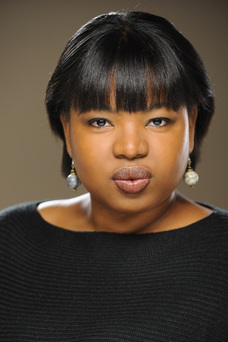 ABOUT AKIBA ABAKA Akiba director/playwright/producer, is the founder of the award winning Up, You Mighty Race, a professional theatre dedicated to the research, presentation, and advancement of world heritages and indigenous cultures. Her most notable directing credits include: Joe Turner's Come and Gone, Patience of Nantucket, 409 Edgecombe Avenue… and In the Continuum for which she earned the 2008 IRNE Award for Best Direction. She is currently establishing the Creative Campus Initiative (CCI) at the University of Massachusetts Boston, a multi layered learning environment that fuses theatre arts, media arts and 21stCentury skill building to prepare students for achieving their greatness. ARTISTIC VISION “My ideal theatre provides a playground for the people. It is gritty and challenging like a sand box, adventurous and strong like a jungle gym, thrilling and whimsical like a swing set, and soothing and releasing like a slide. When I first envisioned this theatre, I named it Up, You Mighty Race, in hopes that by empowering my community, this theatre will eventually educate, empower, connect and increase understanding of all people in our Mighty human race. I am happy to say, we are on our way. The best is yet to come!” 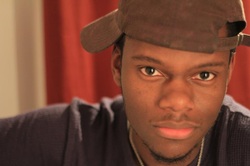 ABOUT TORY BULLOCK Tory is an actor/writer/teacher from Boston, MA. He graduated Boston Arts Academy in 2005 and has been acting professionally ever since. Some of his acting credits include Die Fledermaus, A Soldier’s Play, Neighbors, ARTiculation, Mr. Marmalade, The Overwhelming, and After Ashley just to name a few. He is also the founder and head writer for ARTiculation ( A Boston based poetry meets theatre collective founded in 2005). While he is an artist, he is also an arts educator currently employed by Urban Improv (www.UrbanImprov.org) touted as a "Rehearsal for life". Tory’s job is to perform for and work with groups of elementary school aged children. Through skits, song, dance, and discussion they are equipped with the tools necessary to navigate through any daily issues they might encounter. 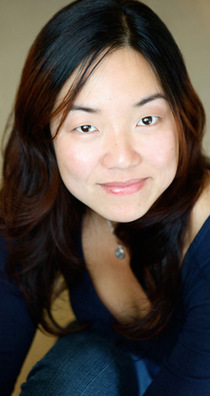 ABOUT DESDEMONA CHIANG Desdemona Chiang is the Associate Artistic Director of Impact Theatre in Berkeley and Co-Founder / Associate Artist of Azeotrope in Seattle. Selected Directing Credits: Crowded Fire Theatre Company, Playwrights Foundation, Washington Ensemble Theatre, Golden Thread Productions, Fringe NYC, and Cornish College of the Arts. Assistant Directing / Dramaturgy: Oregon Shakespeare Festival, Playmakers Rep, Rattlestick Playwrights Theatre, ACT Seattle, Arizona Theatre Company. Drama League New York Directing Fellow. Associate Member, Stage Directors and Choreographers Society (SDC). Alumna, Lincoln Center Theater Directors Lab and Directors Lab West. BA, Integrative Biology and Theatre: University of California at Berkeley. MFA Directing: University of Washington. ARTISTIC VISION “For me, theatre is visibility, representation, and communication—the sharing of ideas and experiences. We’re living in one of the most fascinating and theatrical eras in human history—of reality TV, FlashMob, YouTube, web2.0 and Facebook—where people are picking up FlipCams and iPhones, creating their own narrative, and becoming each other’s audiences. Theatricality is everywhere, yet the theatre itself is perceived as anachronistic. If theatre is a reflection of the world it comes from, then what are the stories and forms of this generation? Who are our gods, heroes and monsters, and how do we talk about them?” 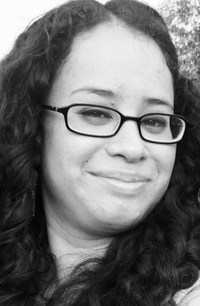 ABOUT ALEJANDRA CISNEROS Alejandra is a graduate from the University of California, Irvine. She directs/produces Los Angeles based theater including the cult-classic superhero series El Verde! which has toured throughout Southern California. Recent credits include The Way of Water by Caridad Svich for East LA Rep, Rosa Out of Control for the 2012 Los Angeles Times Festival of Books and pre-production for the third annual Meet Me at Metro. She is a member of Individual Artist Collective and alum of Director’s Lab West. She was awarded a Directing FAIR Fellowship for the 2012 Oregon Shakespeare Festival season, assisting on Animal Crackers. ARTISTIC VISION “I am passionate about non-profit community theatre that invests in the Individual Artist. Theatre that not only sustains the stories and history of a community but the home-grown artists of that community; whether it be through development/training or opportunity to participate. The type of theatre that I would like to continue to create is comedic; infused with the Latino voice of my community, in which the everyday individual is the heroine/hero.” 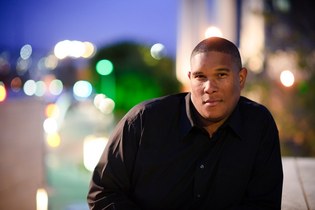 Photo by Anna Mae Lam Photography. Photo by Anna Mae Lam Photography. ABOUT MALCOLM DARRELL Malcolm is a native of Los Angeles, California. He earned his BA from U.C. Berkeley and an MFA in Theater Management from Yale School of Drama. Malcolm has enjoyed collaborating with Cal Performances, The New Victory Theatre, Cornerstone Theatre Company and The Association of Performing Arts Presenters. In 2007, he received the Foundry Theatre’s Inaugural Producer’s Chair Award and co-produced the critically acclaimed play The Brothers Size, by Tarell McCraney, at The Public Theater’s Under the Radar Festival. In the fall of 2007, Malcolm became the founding General Manager of Ebony Reprtory Theatre, Los Angeles’ first African American Equity company. Presently he is the New Play Production Associate at Center Theatre Group. ARTISTIC VISION "Make a career of humanity. Commit yourself to the noble struggle for equal rights. You will make a greater person of yourself, a greater nation of your country, and a finer world to live in." Rev. Dr. Martin Luther King Jr., 1959 "Recently I was reminded why ultimately my life’s work, my personal mission, is entrenched in the ideals of living in a world where equitable access to art is a human right. The world and theatre I long to create, inhabit, sustain and support recognizes that ethnic and gender diversity is vital to our survival as an industry. It’s a theatre that easily sees a black son of South Central Los Angeles or a Chicana daughter of the Rio Grande Valley helming the largest resident theatre in America as easily as it does their white counterpart. It’s the finer world I dream of often and now is the moment for us to wake and make it our reality. 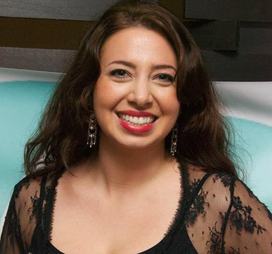 ABOUT J.J. EL-FAR J.J. El-Far is an Arab-American producer and interdisciplinary artist in Harlem. She is the Founding Executive Director of Hybrid Theatre Works and Founding Creative Director of the Harlem Arts Festival. Contributing theater critic for Uptown Flavor. JJ has worked with Theatre Without Borders as a Core Team member producing the “Acting Together on the World Stage” conferences; Ted X Harlem; LaGuardia Performing Arts Center; Berkshire Theatre Festival; and Jerash Festival of Arts and Culture in Amman, Jordan. She attended La MaMa International Symposium for Directors in Umbria, Italy. B.A. from Brandeis University in Theater Arts and International Global Studies. ARTISTIC VISION “I want to see theater that challenges the notion of what theater can be, and who it can reach. I am interested in the theatrical experience, immersive events, and attracting new audiences. I am interested in creating and supporting international collaborations between artists who can share resources, inspirations, and stories. In creative collaboration we actively practice cultural diplomacy, and peace building by sharing our common humanity. I am interested in theater about relevant global issues that can create social transformation, uplift, heal and educate. I believe theater should be intelligent, thought provoking, and subversive but never take itself too seriously.” 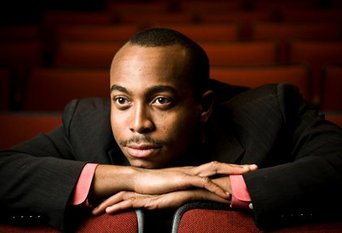 ABOUT ALFRED HEARTLEY Al is originally from North Carolina and grew up in Atlanta, GA. He attended Florida State University where he graduated with a BA in Theater with Honors. While at Florida State, Al concentrated in Directing and Theater Studies. He directed several productions including, Jitney, Doubt, a parable, and The Brothers Size which was funded by the Atlantic Coastal Conference Fellowship. Al served as the Casting Intern for Steppenwolf Theater Company and recently finished being the Theater Management Apprentice where he was also a Multicultural Fellow. Al currently serves as the Associate Artistic Director of Sankofa Theater Company, a new storefront committed to diversity, in Chicago. ARTISTIC VISION “I like the idea of reclamation in theater. A theater that seeks to reclaim and examine its own identity constantly throughout its organizational lifetime. A place where artists are nurtured, supported, and given the utmost of respect. I fight for a truly diverse theater, a theater that senses that racism is still an issue when it comes to diversity (not just adding Black and that equals diversity). A theater that fights for every voice. A theater that rises and lifts others with them in their success. A theater that teaches. A theater that mingles new work with old work. Multifarious, honest, willing to say yes, willing to fail, willing to have boulders thrown at the stage.” 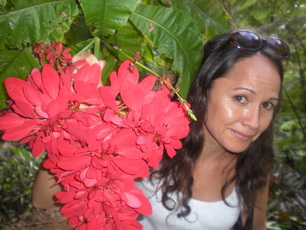 ABOUT MAILE HOLCK Maile has worked as an actor and sometimes teaching artist with Honolulu Theatre for Youth since 2008. Prior to that she lived in New York and worked with the National Asian American Theatre Company, Pacific Performance Project East, Yara Arts Group, La MaMa, Etc. as well as regionally. Internationally, she has worked in Germany and Japan. Maile holds an MFA in Acting from the University of Washington. She is about to enter her fifth season with HTY and is currently working on an original piece of her own which she hopes to produce early next year. ARTISTIC VISION “My goal is to continue to work with Honolulu Theatre for Youth creating theatre that directly connects with children in Hawaii by working as an actor or arts administrator. I wish to create work of my own for adult audiences that connects with various communities in Hawaii in a similar way. The theatre I seek to create on my own would be non-linear in nature, stark in production needs, experimental in movement and text, and rich in human story. I seek to use theatre as a tool to enrich, awaken, connect, perhaps change and even enlighten those who see it.” 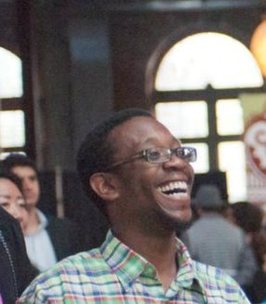 ABOUT ELBERT JOSEPH (EJ) Elbert decided to be an actor at age 12 after seeing Peter Pan. He wrote the casting director for the Wheelock Theater, she cast him as a munchkin in the Wizard of Oz. The theatre transformed his life. It taught him that there are many kinds of people in the world and he no longer felt so alone. Ever since, he has been taking acting training at Wheelock, Project Shakespeare, and Pah! Deaf Youth, Huntington Theatre and performing at local theatres. He is also an American Sign Language theatrical Interpreter/Coach. ARTISTIC VISION “I'd contribute my experiences with the obstacles of being a black and hard of hearing actor, as well as my experiences as an American Sign Language theatrical Interpreter and share how equal access was important in shaping my experiences in theater. I would like a chance to convey that interpreters reach another part of their audience by communicating the color of emotional depth of their character for Deaf/Hard of Hearing patrons. I'd love the opportunity to bridge the gap that exists between the hard of hearing and the hearing community. Also, I would like to help with directing and/or casting.” 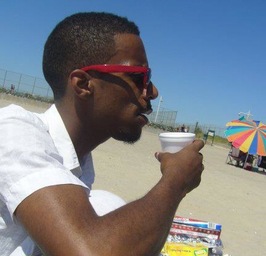 ABOUT ANDRE LANCASTER Andre Alexander Lancaster is the founding artistic producer at Freedom Train, an award-winning NYC-based theater that advances new understandings of our shared humanity through plays spotlighting the perspectives of black queer characters. At Freedom Train, which he founded in 2006, and later at The Public Theater and Oregon Shakespeare Festival he has produced or dramaturged the work of Jesse Cameron Alick, Sharon Bridgforth, Oded Gross, Patricia Ione Lloyd, Ayanna Maia, Jerome A. Parker, Harrison David Rivers, Betty Shamieh, and a number of other established and emerging playwrights. Distinguished honors include the NYC Social Justice Fellowship Award (Soros Foundation/NYU Wagner), Nathan Cummings Young Leaders of Color Award (Theatre Communications Group), and the Early Career Dramaturg Travel Grant (Literary Managers and Dramaturgs of the Americas). Freedom Train has been recognized with the Fruitie Award from Fresh Fruit Theater Festival and the Otto Rene Castillo Award for Political Theater from Castillo Theatre and has been featured in Time Out New York and NY Daily News. In April, Andre completed a Literary Apprentice Residency at Oregon Shakespeare Festival, and starting in the fall he will be the 2012-13 Thomas Proehl Producing Fellow at The Foundry Theatre. BA in Theater Arts, State University of New York at New Paltz. www.cargocollective.com/alancaster ARTISTIC VISION “The theater that whets my appetite mixes in a little of Chekhov and Shaw’s old school social activism with healthy portions of perspectives that resonate personally with me. Case in point: Jerome A. Parker is a close collaborator. We worked together at The Public and Freedom Train. He will be in an anthology of new black queer theater that I am co-editing. The grit and the greatness of the Bronx and Christopher Street piers live in his adaptations of Wagner and Genet. I simply think Jerome is the black gay version of Sarah Kane, and the archetype of the urban artist I go to bat for.” 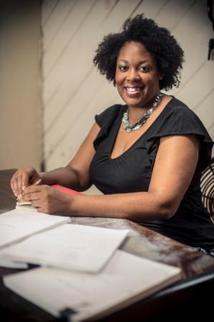 ABOUT JACQUELINE E. LAWTON Playwright, dramaturg, and teaching artist, Jacqueline received her MFA in Playwriting from the University of Texas at Austin. She is the author of Anna K; Blood-Bound and Tongue Tied; Deep Belly Beautiful; The Hampton Years; Ira Aldridge: The African Roscius; Love Brothers Serenade and Mad Breed. Recently nominated for the Wendy Wasserstein Prize and a PONY Fellowship (Lark Play Development Center), Lawton was named one of 30 of the nation’s leading black playwrights by Arena Stage’s American Voices New Play Institute. She is a Professor of Theater at the University of the District of Columbia. ARTISTIC STATEMENT “As a DC-based playwright, dramaturg and teaching artist, I've taken full advantage of the many diverse and exciting theatres doing original work, including serving as an actor, director, and producer on occasion. These experiences have given me a deep awareness and profound understanding of how to develop new work. I think it's essential to share what I’ve learned with other writers of color. As an Artistic Director, my mission would be to commission, develop and premiere the work of playwrights of color as well as steward their second and third productions to other theaters across the nation. My ultimate dream is to found and run a Writer's Colony for playwrights of color.” 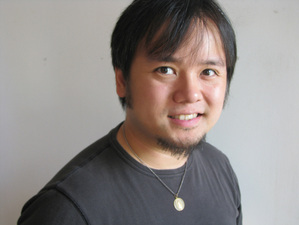 ABOUT QUI NGUYEN Qui is a playwright, fight director, and Co-Artistic Director of the OBIE Award-winning Vampire Cowboys of New York City. Recent premieres include The Inexplicable Redemption of Agent G (Ma-Yi Theater & Vampire Cowboys), She Kills Monsters (The Flea), Lush Valley (HERE), and Krunk Fu Battle Battle (East West Players). He is a proud member of New Dramatists, The Playwrights’ Center, Ensemble Studio Theatre, The Ma-Yi Writers Lab, and an alumnus of Youngblood. His company, Vampire Cowboys, is the only theatre company officially sponsored by NY Comic Con. ABOUT ARTISTIC VISION “I make "geek theatre". I write and create using the language of the arcade, the comic book, and the Hollywood blockbuster. And I do it all in the service of both entertainment and artistic exploration. I'm fascinated by the fine line between low and high brow art. I'm a rabid geek who loves creating spectacle and pushing the boundaries of what "low-brow humor" can do. And I do this with a focus on female, racially diverse, and LGBT heroes because I think everyone deserves a chance to see themselves kick ass onstage.” 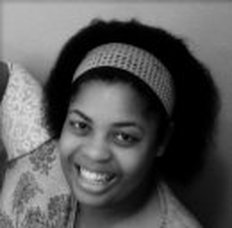 ABOUT YOLANDA WILLIAMS Yolanda is a native of Jackson, Mississippi. She received her B.A. in Drama from the University of Dallas, her M.F.A. in Directing from the University of Southern Mississippi and completed a directing internship with Georgia Shakespeare. She is a faculty member at Jackson State University, adjunct faculty at Tulane University and directs at various theatres in the Mississippi area. She has directed a variety of shows that include: Mojo: A Black Love Story, The Bald Soprano, Intimate Apparel, Waiting for the Parade, Noises Off, It’s A Wonderful Life: A Live Radio Play, Antigone and For Colored Girls… ARTISTIC VISION “I envision a not-for-profit theatre in Mississippi with a primary focus on experimental works that reflect all aspects of society, which are often suppressed or ignored. My plan is to break the censor shield that dominates Mississippi for the greater good of the artists and the audience. There exists an audience base eager to receive these productions. My goal is to push past preconceived notions of presenting the typical Southern acceptable play and offer a venue for artists to create, innovate and communicate freely to their community and shared society.” What question is your life answering?
This was the astonishing question that motivational speaker, Paul Robinson, asked us near the end of our Values Clarification Workshop. When he asked it, there was a collective gasp and an electrifying resonance reverberated throughout the room. We couldn't write his words down fast enough. This question cracked open our worlds. It also mirrored a piece of advice that we were given in a later session on Career Development with Field Experts. When discussing resumes and how to set oneself apart, we were told that instead of listing our education and work experience, we should start listing what happened in the world because we were there. One of my proudest work experiences was a freelance directing gig I did in April of 2004. I was hired by Voices Against Violence, an organization at the University of Texas at Austin ’s Counseling & Mental Health Center, to direct a Mock Trial on acquaintance rape. I worked with three young students: one woman and two men. We rehearsed for 6 weeks. Sometimes I worked with them one on one and other times in two's or as a group. We worked to establish their relationships: three best friends, one of the men had become interested in the woman and she in him. We also built the scenario of the acquaintance rape: a night of drinking, so no one could say exactly what or how things happened. Our work culminated in a mock trial, which was presided over by an actual judge. The plaintiff (the young woman) and the defendant (one of the young men) had actual attorneys. The audience of about 100 served as the jury. It was an intimate, challenging, scary and life transforming experience for all of us. When I think about that work, it reminds me of why I value theatre as a tool for social change. I haven't done this type of theatre in a long time, but I want to get back to it. I honestly didn't know how much I missed it, until being put to task on the value and purpose of my life. At the end of the Values Clarification Workshop, I looked around the room at the other Young Leaders of Color. These once beautiful, curious strangers were now allies, heroes, champions and friends. They were all glowing and appeared to be 10 feet tall. Going on three weeks later, I am still feeling the impact of the this workshop (and the many sessions, discussions, panels, and soirees, including dancing past sweat and exhaustion). This whole experience woke me up to myself! My soul was shaken, my mind blown, my world spun on its axis and my molecules shifted. I felt whole, energized and renewed. It makes me think of the many ways one can be awoken ... A new love. A new friend. An authentic moment on stage. A line of poetry. An act of human kindness. The courage of someone standing up for themselves in a room full of dissenters. Unexpected laughter. Children at play. The perseverance of someone overcoming great challenges against all odds. The loss of a loved one. A kind touch. A kiss. The glance of a stranger that holds a promise of something new, exciting and different. The realization that something you did or created spoke to someone else. Really, truly, to be awoken to yourself is a remarkable and beautiful thing. May you all be granted this wondrous gift. |
My BlogI'm a playwright, dramaturg, and teaching artist. It is here where you'll find my queries and musings on life, theater and the world. My posts advocate for diversity, inclusion, and equity in the American Theatre and updates on my own work. Please enjoy!
Categories
All
Archives
June 2020
Reading List
|
